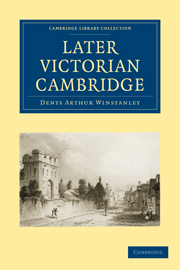Book contents
- Frontmatter
- D.A.W. A Memorial Note
- Contents
- PREFACE
- Chapter I ROBINSON'S VOTE
- Chapter II THE JUDGES AND TRINITY COLLEGE
- Chapter III THE RELIGIOUS TESTS (1862–1871)
- Chapter IV THE CAMBRIDGE UNIVERSITY AND CORPORATION ACT
- Chapter V EDUCATIONAL REFORM (1860–1880)
- Chapter VI THE TRINITY REFORMERS
- Chapter VII THE STATUTORY COMMISSIONERS AND THE UNIVERSITY
- Chapter VIII THE STATUTORY COMMISSIONERS AND THE COLLEGES
- Index
Chapter VI - THE TRINITY REFORMERS
Published online by Cambridge University Press: 07 September 2010
- Frontmatter
- D.A.W. A Memorial Note
- Contents
- PREFACE
- Chapter I ROBINSON'S VOTE
- Chapter II THE JUDGES AND TRINITY COLLEGE
- Chapter III THE RELIGIOUS TESTS (1862–1871)
- Chapter IV THE CAMBRIDGE UNIVERSITY AND CORPORATION ACT
- Chapter V EDUCATIONAL REFORM (1860–1880)
- Chapter VI THE TRINITY REFORMERS
- Chapter VII THE STATUTORY COMMISSIONERS AND THE UNIVERSITY
- Chapter VIII THE STATUTORY COMMISSIONERS AND THE COLLEGES
- Index
Summary
When the Parliamentary Commissioners appointed by the Act of 1856 had completed their task of revising the statutes of the University and colleges, many resident members of the Senate must have found comfort in the thought that the upheaval had been less violent than they had anticipated. Certain ancient and familiar landmarks had disappeared; but the Commissioners, particularly in dealing with the colleges, had been tolerant of deeply rooted prejudices, and had refrained from pressing some of their more unacceptable proposals. The statutes of several colleges, as revised under their supervision, continued to require a certain number of the Fellows to be in Holy Orders, and imposed the same obligation upon Heads of Houses. The rule moreover that a fellowship was forfeited by marriage was only partially relaxed; and the Commissioners had not persisted in their demand that the colleges should contribute to the financial support of the University.
Their moderation was partly due to a laudable desire not to leave behind them a trail of bitterness and resentment; but they can fairly be accused of straining the quality of mercy. It was very undesirable that Fellows of colleges should ever be compelled to choose between losing a provision for life and being ordained; and inevitably some of those who chose the latter alternative were ill-fitted for the ministry of the Church. Further, it was detrimental to the efficiency of academic instruction that so many of the Fellows were unable to marry, as it tended to make a University career unattractive for men of sufficient ability to be able confidently to count upon finding elsewhere a market for their talents.
- Type
- Chapter
- Information
- Later Victorian Cambridge , pp. 236 - 262Publisher: Cambridge University PressPrint publication year: 2009First published in: 1947

